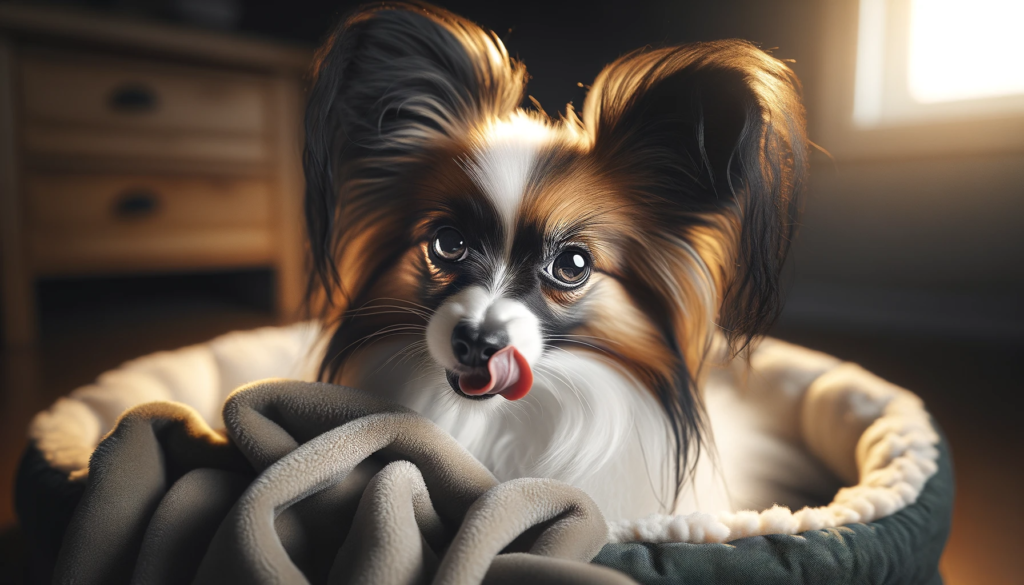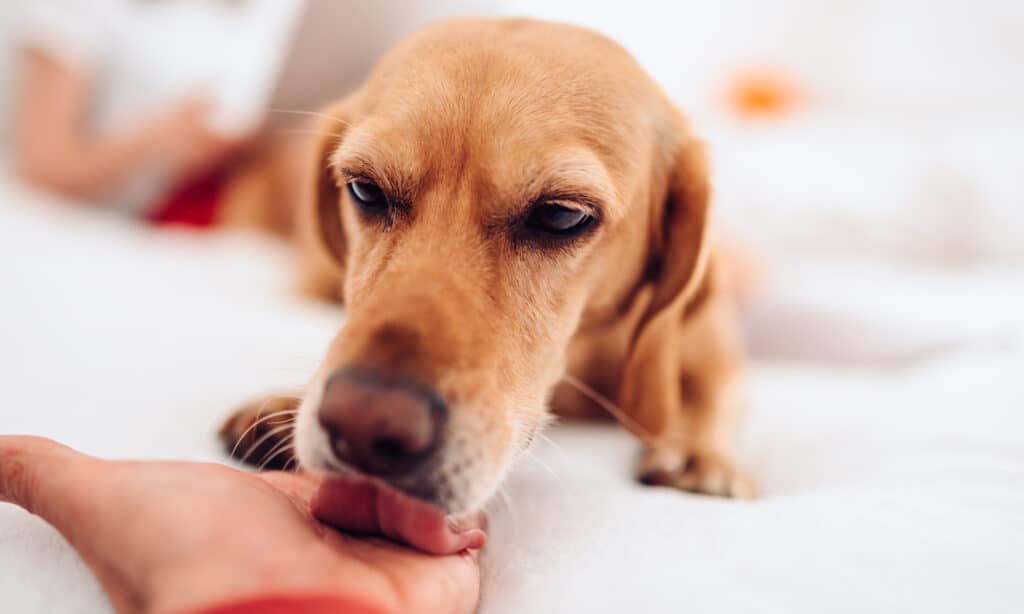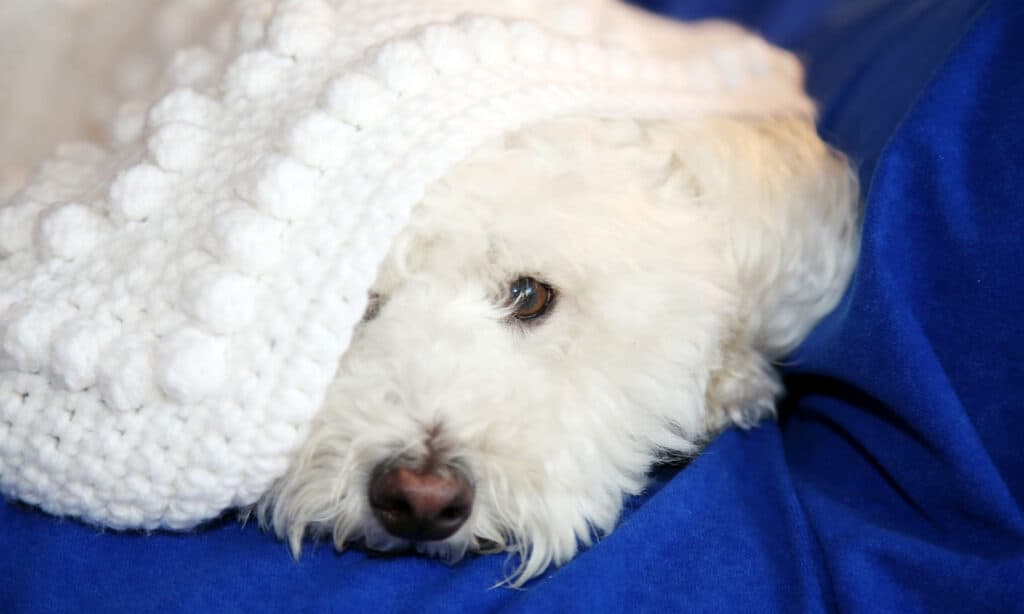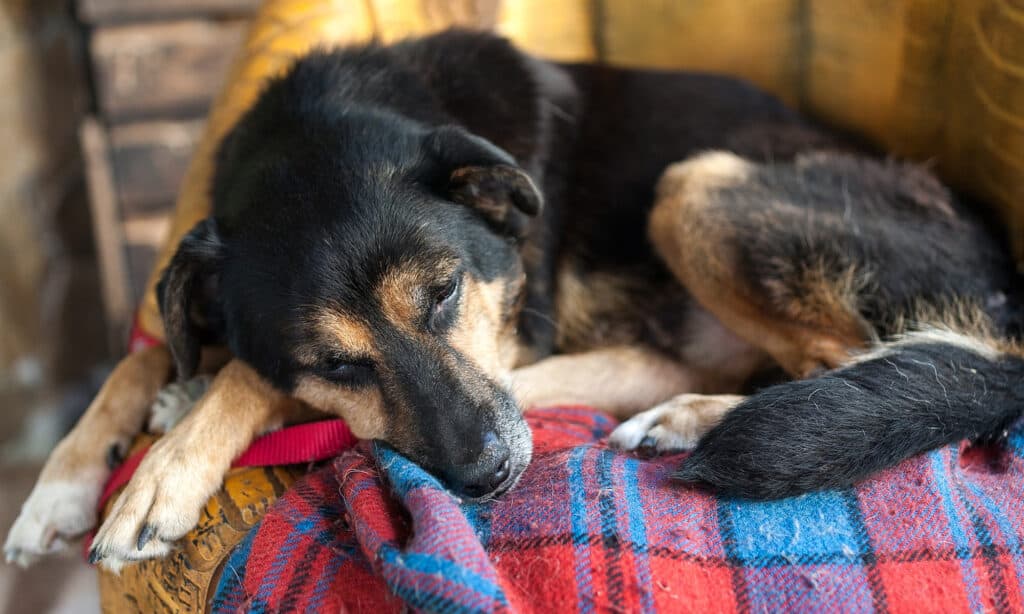Dogs are known for their quirky and often endearing behaviors, and one such behavior that can leave pet owners scratching their heads is why dogs lick blankets. While some may dismiss this behavior as simply cute or harmless, it can actually be an indication of underlying health or behavioral issues. In this blog post, we’ll delve into the reasons why dogs lick blankets and what it could mean for your furry friend’s well-being. Whether you’re a seasoned dog owner or a new pet parent, understanding this behavior can help you better care for and communicate with your furry companion.

Reasons Why Your Dog Licks Blankets
There are several reasons why your pup might be licking blankets. Here are some of the most common reasons:
- Compulsive behavior: This can be a compulsive behavior that can be a sign of underlying anxiety or stress.
- Anxiety: This can be a self-soothing behavior when they are feeling anxious or stressed. This can be caused by a variety of factors such as separation anxiety, changes in routine, or loud noises.
- Taste: Some dogs may simply enjoy the taste of the fabric, especially if the blanket has food or other tasty scents on it.
- Smell: Dogs have an incredible sense of smell and may be attracted to the scent of their owner on the blanket, or to other scents that are present on the fabric.
- Inadvertent reward: If you have inadvertently rewarded your pup for licking blankets by providing attention or treats, your pup may continue the behavior as a way to get your attention.
It’s important to note that blanket licking can also be a symptom of an underlying medical issue, such as gastrointestinal problems or dental issues. If you are concerned about your dog’s blanket-licking behavior, it’s always best to consult with your veterinarian to rule out any medical causes.
Understanding Compulsive Behavior in Pups Who Lick Blankets
Compulsive behavior in dogs who lick blankets may be a sign of underlying anxiety or stress. If you notice your furry friend engaging in repetitive actions or behaviors that seem to serve no purpose, it’s important to understand that there may be an underlying issue causing this behavior.
Compulsive behavior can be caused by various factors, including genetics, environmental factors, or a history of abuse or neglect. It can also be a coping mechanism for boredom or anxiety in dogs. To help alleviate anxiety, consider increasing your dog’s exercise, playtime, and socialization.
If your dog’s compulsive behavior persists, it’s best to consult with a certified dog trainer or veterinary behaviorist who can provide guidance on the best treatment options. They can help identify the underlying cause of your dog’s behavior and suggest medication or behavior modification techniques to manage it.
Left untreated, compulsive behavior can lead to other behavioral or health issues, so it’s essential to address it. With time, patience, and understanding, you can help your dog overcome compulsive behavior and lead a happy, healthy life.

How Anxiety Can Cause Your Pup to Lick Blankets
Anxiety can be a significant factor that causes dogs to lick blankets. Dogs may engage in this behavior as a way to self-soothe when they are feeling anxious or stressed. It’s crucial to understand that dogs can experience anxiety for a variety of reasons, such as separation anxiety, changes in routine, or loud noises.
When dogs are anxious, they may look for ways to alleviate their stress, and licking blankets can be one such way. The repetitive motion of licking can have a calming effect on dogs, and they may continue to lick the blanket as a way to self-soothe.
If you notice that your pup is licking blankets more frequently than usual, it’s essential to pay attention to any changes in your dog’s behavior. Other signs of anxiety in dogs may include panting, shaking, pacing, or whining.
To help alleviate anxiety in dogs, there are a few things you can do. You can try to identify the source of your dog’s anxiety and work to address it. This may involve providing more exercise, creating a calming environment, or using anti-anxiety medications.
Providing your dog with plenty of attention, love, and reassurance can also help alleviate anxiety. You can also give your pup interactive toys or puzzles to keep them occupied and distracted from licking blankets.
Dr. Candy’s Favorite Supplements for Anxious Dogs
As a veterinarian, Dr. Candy understands the struggles of having an anxious dog. While there are various solutions to alleviate anxiety, supplements have become increasingly popular due to their natural ingredients and effectiveness. In this section, Dr. Candy shares her favorite supplements to help calm and soothe anxious dogs.

Standard Process Canine Adrenal Support
Canine Adrenal support is a dietary supplement formulated to help support and maintain healthy adrenal function in dogs.

Standard Process Drenamin Tablets
Drenamin is a dietary supplement made from a blend of whole-food ingredients designed to support adrenal function and help the body manage stress.

Standard Process Min-Chex Capsules
Min-Chex is a dietary supplement that contains a blend of minerals, vitamins, and other nutrients designed to support healthy nervous system function.
Dr. Candy will often use these supplements in combination to help anxious dogs find and maintain balance of their adrenal glands and bring them out of “fight or flight.
Dogs Lick Blankets Because They Like The Taste: Is It Normal?
A common and normal behavior among dogs is licking blankets, often driven by their taste. Dogs have a strong sense of taste and may find the flavor and texture of the fabric appealing. However, it’s essential to keep an eye on the frequency of blanket licking as excessive licking can be a sign of other underlying issues.
If your dog is excessively licking blankets, it’s best to investigate other potential causes, such as anxiety or compulsive behavior. It’s important to ensure that your dog is getting a balanced diet and is not lacking any essential nutrients that could cause abnormal behavior.
If you’re concerned that your dog’s blanket-licking behavior may be due to a medical issue, consult with a veterinarian. They can help rule out any underlying health problems that may be contributing to the behavior.

Why Your Dog Licks Blankets – Exploring the Connection Between Scent and Behavior
Dogs have an incredible sense of smell and are often attracted to the scent of their owners or other familiar smells. Therefore, one reason why dogs may lick blankets is because they can smell their owner’s scent on them.
Dogs use scent as a means of communication, and they may lick blankets as a way to mark their territory or to feel closer to their owner. This behavior is also common when a dog is feeling anxious or stressed and is seeking comfort from their owner’s scent.
If your dog’s blanket licking is causing concern, you can try washing the blanket to remove your scent or spraying it with a scent that your dog finds less attractive. Providing your dog with a comfortable and safe space to relax can also help reduce anxiety and the need to lick blankets.
Are You Accidentally Encouraging Your Dog to Lick Blankets?
You may unknowingly be rewarding your dog for licking blankets, which can encourage them to continue the behavior. Dogs seek attention and affection from their owners, and if you provide treats or attention in response to their behavior, they may perceive it as a reward and continue the behavior.
To discourage your dog from licking blankets, it’s important to redirect their attention to other activities, such as playing with toys or engaging in training exercises. Providing your dog with interactive toys or puzzles can also help keep them occupied and distracted from licking blankets.
Ensuring that your dog is getting enough exercise and attention is also important, as bored or understimulated dogs may develop abnormal behaviors, such as excessive blanket licking.

Key Considerations When Your Dog First Starts Licking Blankets
When your dog first starts licking blankets, there are a few key considerations to keep in mind. Here are some things to consider:
- Changes in behavior: If your dog suddenly starts licking blankets more frequently, it may be a sign of an underlying issue, such as anxiety or stress. Keep an eye out for other changes in your dog’s behavior, such as decreased appetite, lethargy, or increased agitation.
- Medical issues: If your dog has never licked blankets before and suddenly starts, it’s important to rule out any medical issues that may be causing the behavior. Medical issues such as gastrointestinal problems or dental issues can cause your dog to lick blankets.
- Environment: Changes in your dog’s environment may also cause them to start licking blankets. This can include changes in routine or the introduction of new family members or pets.
- Inadvertent reward: It’s essential to be mindful of how you respond to your dog’s blanket-licking behavior. If you provide attention or treats in response to the behavior, your dog may continue the behavior as a means of getting rewarded.
- Training and socialization: Proper training and socialization can help prevent abnormal behaviors in dogs, including blanket licking. Providing your dog with plenty of attention, exercise, and mental stimulation can also help prevent excessive licking.
How Often Should You Worry About Your Dog Licking Blankets?
The frequency of your dog licking blankets can be an important indicator of whether the behavior is normal or abnormal. While it is normal for dogs to lick blankets occasionally, excessive licking can be a sign of an underlying issue, such as anxiety, stress, or compulsive behavior.
If your dog is licking blankets more frequently than usual, it’s important to monitor their behavior and look for any other signs of distress or abnormal behavior. Other signs may include decreased appetite, lethargy, or increased agitation.
If your dog’s blanket-licking behavior is accompanied by other symptoms, it’s best to consult with a veterinarian or certified dog trainer. They can help identify the underlying cause of the behavior and provide guidance on the best treatment options.
In general, it’s best to discourage excessive blanket-licking behavior, even if it is not accompanied by any other symptoms. Excessive licking can lead to other behavioral or health issues, and it’s important to address the behavior early on to prevent it from becoming a habit.

Tips for Discouraging Your Dog’s Blanket-Licking Behavior
Discouraging your dog’s blanket-licking behavior can be challenging, but there are a few tips and strategies that you can try. Here are some tips for discouraging your dog’s blanket-licking behavior:
- Provide appropriate chew toys: Providing your dog with appropriate chew toys can help redirect their attention away from blanket licking. Choose toys that are safe, durable, and appealing to your dog.
- Positive reinforcement: Reinforce good behavior with positive reinforcement, such as treats, praise, or affection. When your dog engages in appropriate behavior, such as playing with a toy, reward them with positive reinforcement.
- Environmental changes: Changes to your dog’s environment can help reduce anxiety and stress, which may be contributing to this behavior. Providing a comfortable and safe space for your dog to relax and reducing any potential stressors can help discourage the behavior.
- Training and socialization: Proper training and socialization can help prevent abnormal behaviors in dogs, including blanket licking. Enrolling your dog in obedience training or socialization classes can help reduce stress and anxiety.
- Consistency: Consistency is key when trying to discourage your dog’s blanket-licking behavior. Be patient and consistent in your approach, and don’t give up if you don’t see immediate results.
- Medical issues: Consult a veterinarian if your dog’s blanket-licking is caused by medical issues like dental or gastrointestinal problems.
Ensure Your Dog’s Diet is Appropriate to Reduce Blanket-Licking
Ensuring that your dog is getting a balanced and nutritious diet can be an effective way to reduce their blanket-licking behavior. Here are some tips for ensuring that your dog’s diet is appropriate:
- High-quality dog food: Choose a high-quality dog food that meets your dog’s nutritional needs. Look for dog food that is high in protein, low in carbohydrates, and free from artificial preservatives or fillers.
- Avoid table scraps: Avoid giving your dog highly processed foods. This can upset their stomach and contribute to abnormal behaviors, such as blanket licking.
- Treats in moderation: Treats can be a great way to reinforce positive behavior, but they should be given in moderation. Choose healthy, natural treats and avoid those that are high in sugar or preservatives.
- Consult with a veterinarian: A veterinarian can also recommend specific foods or supplements to help reduce anxiety or stress, which may be contributing to your dog’s blanket-licking behavior.
- Monitor food changes: If you make any changes to your dog’s diet, monitor their behavior and blanket-licking behavior closely. Changes in diet can cause gastrointestinal problems, which may contribute to abnormal behaviors.
By choosing high-quality dog food, avoiding table scraps, giving treats in moderation, consulting with a veterinarian, and monitoring food changes, you can help your furry friend develop healthy habits and lead a happy, healthy life.
Consulting a Vet: When Should You Seek Help About Your Dog Licking Blankets?
It’s important to seek professional help from a veterinarian or a certified dog trainer if your dog’s blanket-licking behavior becomes excessive or is accompanied by other symptoms. Here are some signs that indicate it’s time to consult with a professional:
- Excessive blanket licking: Excessive blanket licking in dogs can signal underlying issues like anxiety or stress.
- Other abnormal behavior: If your dog licks its blanket excessively and shows other unusual behaviors, seek advice from a professional veterinarian.
- Medical issues: Check for medical issues if your dog starts licking blankets despite not having done so before.
- Lack of improvement: Get professional help if your dog’s blanket-licking behavior persists despite various attempted strategies.
- Behavioral issues: A certified dog trainer or behaviorist can help treat your dog’s compulsive or anxious blanket-licking behavior.

Providing Alternatives: Other Things Your Dog Can Lick Besides Blankets
Providing your dog with appropriate alternatives to blanket licking can be an effective way to discourage the behavior. Here are some alternatives that your dog may enjoy:
- Safe and durable chew toys: Give your dog sturdy chew toys to divert their focus from licking blankets and ensure their safety. Choose toys that are appropriate for your dog’s size and chewing style.
- Frozen treats: Dogs can enjoy a refreshing feeling by licking frozen treats like ice cubes or broth.
- Interactive toys: Toys that dispense treats or puzzles can mentally stimulate dogs and promote good behavior.
- Natural treats: Healthy and tasty natural treats like carrots, apples, or peanut butter can prevent blanket licking.
- Lick mats: Using lick mats with food or treats can give your dog a rewarding chewing and licking activity.
It’s important to monitor your dog’s behavior when introducing new alternatives to blanket licking. If your dog shows a preference for a particular alternative, continue to provide it and reinforce good behavior with positive reinforcement.
By providing safe and durable chew toys, frozen treats, interactive toys, natural treats, and lick mats, you can help your furry friend live happy and healthy.
Using Leave-It Training to Stop Your Dog from Licking Blankets
Leave-it training can be a useful technique to discourage your dog’s blanket-licking behavior. Here are the steps for using leave-it training to stop your dog from licking blankets:
- Start with a treat: Hold a treat in your hand and show it to your dog. Say “leave it” and close your hand, so your dog can’t get the treat.
- Wait for your dog to stop: Wait for your dog to stop trying to get the treat. When your dog stops, say “yes” or “good,” and give them a different treat as a reward.
- Repeat the training: Repeat the training, gradually increasing the duration that your dog has to wait before receiving the reward. You can also increase the difficulty by using a more tempting treat or holding it closer to your dog.
- Apply to blanket-licking behavior: Teach your dog “leave-it” with treats and use it to stop their blanket-licking behavior. Redirect your dog’s attention from licking a blanket by saying “leave it” and offering a toy or treat.
- Reinforce good behavior: Reward your dog’s good behavior, like playing with toys or eating treats, with positive reinforcement, such as praise or affection.
Remember to be patient and consistent when using leave-it training to stop your dog from licking blankets. With practice and positive reinforcement, you can help your furry friend develop healthy habits and reduce their blanket-licking behavior.

Choosing the Best Dog Training Program to Address Blanket Licking Behavior
Choosing the best dog training program to address blanket-licking behavior can be a challenging task, but here are some factors to consider:
- Experience and qualifications: Find an experienced and qualified dog trainer to address abnormal behaviors like anxiety or compulsive behavior. A certified dog trainer or behaviorist can provide specialized guidance and support.
- Positive reinforcement: Choose a training program that emphasizes positive reinforcement and avoids punishment-based techniques. Positive reinforcement can help encourage appropriate behavior and strengthen the bond between you and your furry friend.
- Personalized approach: Look for a training program that offers a personalized approach to addressing your dog’s blanket-licking behavior. A one-size-fits-all approach may not be effective for your dog’s specific needs and personality.
- Practicality: Choose a training program that is practical and achievable for your lifestyle and schedule. A program that requires a significant time commitment or expensive equipment may not be feasible for everyone.
- Reviews and recommendations: Look for reviews and recommendations from other dog owners or professionals to help inform your decision. This can help you gain insights into the effectiveness and quality of different training programs.
By selecting a reputable and effective training program, you can help your furry friend develop healthy habits.

Conclusion
In conclusion, blanket licking is a common behavior in dogs, but excessive or compulsive licking can be a sign of an underlying issue, such as anxiety or stress. It’s important to monitor your dog’s behavior and seek professional help if necessary. There are several strategies that you can try to discourage your dog’s blanket-licking behavior, including providing appropriate alternatives, leave-it training, and addressing any underlying medical or behavioral issues.
Additionally, ensuring that your dog’s diet is well-balanced and providing them with appropriate chew toys can help reduce their blanket-licking behavior. Picking a dog training program to stop blanket licking is hard, but reviews, experience, and positive reinforcement can help.
By being attentive and proactive, you can help your furry friend lead a happy, healthy life free from excessive or compulsive blanket-licking behavior. Remember to be patient and consistent, and seek professional help if necessary. With proper guidance and support, you can help your furry friend develop healthy habits and enjoy a happy and fulfilling life.
~Sheena
